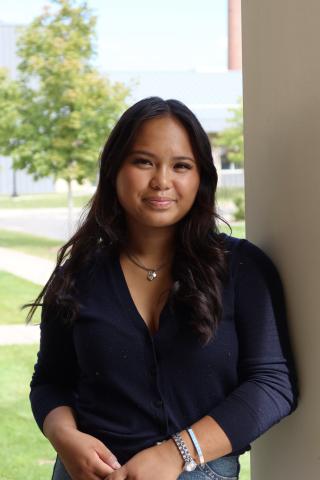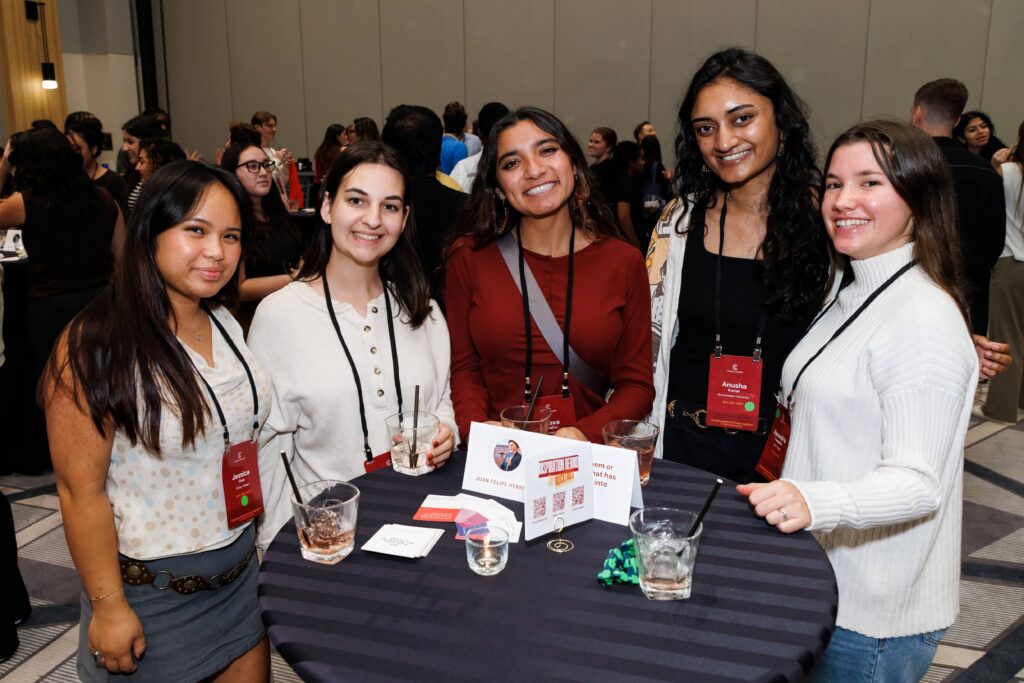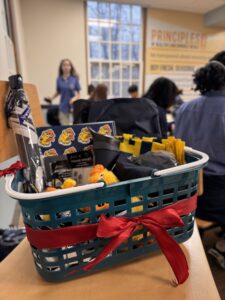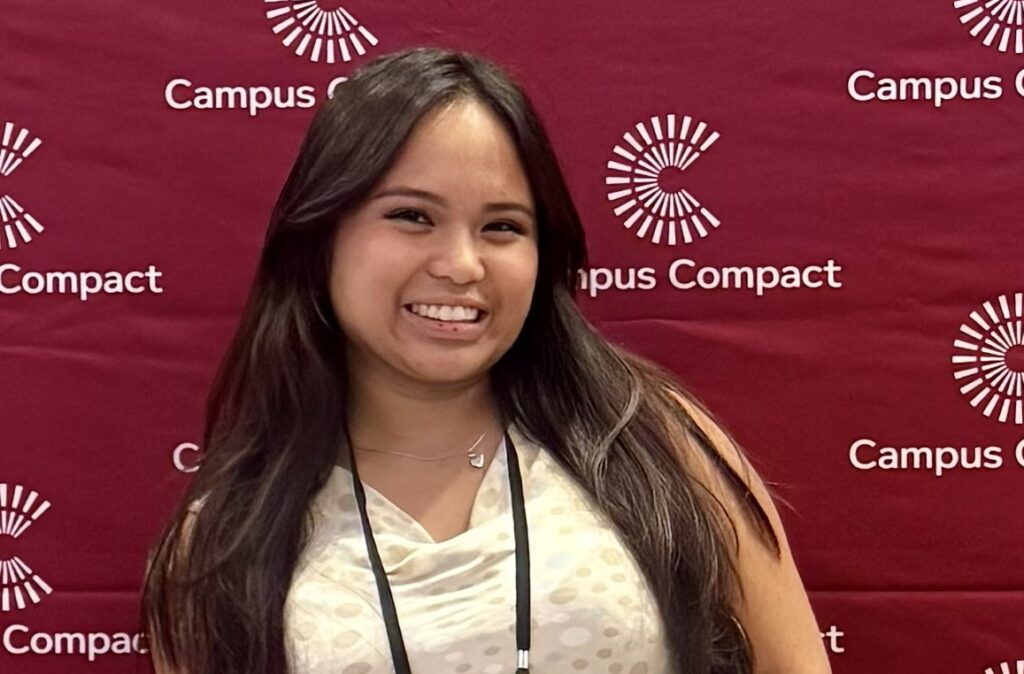Trinity College student Jessica Cruz ’26 was announced recently as a recipient of the 2025–26 Newman Civic Fellowship from Campus Compact. The fellowship is a yearlong program that recognizes students for their leadership potential and commitment to creating positive change in communities. Campus Compact is a national coalition of colleges and universities working to advance the public purposes of higher education.

Fellows are nominated by their college president based on their potential for public leadership and their work with communities. The 2025–26 fellowship class includes 150 members. Throughout the fellowship year, Campus Compact provides students with opportunities to develop their leadership and other skills and to help them engage in strategies for social change. Cruz took park recently in the annual in-person Convening of Fellows, where she connected with and learned from the other fellows.
Cruz is an educational studies major, a Posse Scholar from Chicago, and an active student-worker for several programs within Trinity’s Center for Hartford Engagement and Research (CHER) with a deep commitment to educational equity, community engagement, and building inclusive communities.
Trinity College President Daniel G. Lugo said in his nomination of Cruz, “At the heart of her approach is a commitment to working within communities by listening to lived experiences of systemic inequities and co-creating solutions with those directly impacted.”
On campus, Cruz serves as president of the Asian American Student Association and a senior Promoting Respect for Inclusive Diversity in Education (P.R.I.D.E.) leader. She strengthens campus-community connections through her involvement in the Trinfo community garden and her documentary filmmaking. Cruz also is co-president of Garden Groupies, a student organization that leads community gardening projects. “Jessica’s thoughtful leadership and reflective practice make her an outstanding representative of Trinity College and a strong voice in the next generation of civic leaders,” added Lugo.
Hear more from Cruz about her community engagement work and her Newman Civic Fellowship here:
What made you want to help with community education?
The start of my passion began when I was really young. I’m in a family of six kids and I’m the third. My older brother—the eldest child—raised my siblings and I in a way, as we were growing up. Once I saw what he did for us, I also wanted to reflect that with my younger three siblings. For my three younger siblings, I liked being a caretaker for them in the ways I could, and seeing them smile was what I enjoyed most. In high school I was a tutor for geometry and I loved it. Students don’t generally like being tutored in math, but I like to say I made the kids have fun with it. Also, during COVID-19 my little brother was in second grade. I would be at home at my desk working while he was doing his best to learn on a laptop. I helped him a lot during that time and found that I really enjoyed teaching little kids. Teaching has felt very natural for me, so working in schools has felt like second nature.
What are some of your goals when engaging with communities?

An aspect of the Newman Civic Fellowship convening that we discussed a lot was that question about passions and goals. Someone once called me a quiet leader, and I really liked that because I want to give a community what they need. I also like the idea of mutual community benefit; I never want to feel like I am in this group or community and telling them what they need. For example, with my students, they come to me and explain their concerns and I sit down with them and figure out whatever they need. On a broader level in Hartford, if the students and I have noticed that there is a lot of trash, we go and pick up some trash. My approach is a grassroots style; even if what I am doing is not going to change policy, connection and collaboration are important.
What are some initiatives you have been a part of to help support education in your community?

One initiative I do on our campus is to mentor high school students at HMTCA [Hartford Magnet Trinity College Academy], and the students I mentor take classes at Trinity. They are high school students—mainly seniors—and I meet with them on a bi-weekly basis to talk about how their classes are, ways I can help them out, and what resources are available to them. In addition to the classes they take at Trinity, I help them with college applications and with the transition from high school to college. Many of the students, like me, are first-generation college students, so I help them with the FAFSA [Free Application for Student Financial Aid] and workshops to help them in the application process. At one point I was in the same boat as they are now, so I try to give them as many resources as I can and be there for what they need.
What experiences at Trinity have helped to shape your community engagement?
When I first arrived at Trinity, I went to Trinfo [the neighborhood community space, computer lab, and garden] at the suggestion of my advisor at the time, and I told them how I loved tutoring and teaching my little brother in high school. I began after-school teaching with their programming. When I was doing that, I volunteered and taught at another neighborhood school and learned to prepare lessons to teach students online software like PowerPoint, Google Slides, and even how to copy and paste. I also have been a P.R.I.D.E. leader. I went through the P.R.I.D.E program, too. The whole weekend of orientation, I met a bunch of people, went around the campus and the community, met with different offices, and connected with students who knew the ins and outs of life on campus. I then came back as a first-year P.R.I.D.E leader, and am now a senior P.R.I.D.E. leader. I mentor the first-year leaders and returning leaders.
How have you applied what you’ve learned in your Trinity classes to your work in the community?
My Trinity classes for educational studies have been amazing. They are very person-centered. We learn a lot about the educational system, which has opened my eyes to things that I originally wouldn’t have thought of. The biggest thing is that no two people are the same or learn the same. Every person has a distinct style of learning, and through HMTCA I have gotten better at understanding that. For example, my high school students wouldn’t answer emails, so instead I would just shoot them a text because that is what they prefer.
What does it mean to you to receive the Newman Civic Fellowship from Campus Compact? How can it help you continue your path in education?

It means a lot that the people I have learned from and who have mentored me chose me to be the Trinity College Newman Civic Fellow. The award is wonderful, but ultimately not what I do my work for. I sometimes get uncomfortable when something is about me. I like to connect with my community and make connections within the fellowship. The fellowship also provides opportunities to receive funding for passion projects. I came into college wanting to be an elementary school teacher, but now, through the opportunities offered by CHER, the Newman Civic Fellowship, and my support system on this campus, I have so many more ideas of what I want to do after I graduate from Trinity. I may go to graduate school for educational leadership, do community organizing, illustrate a children’s book, or continue my journey with film that I started here. All I know is I love working with the community on grassroots change, I love the arts, and I love teaching and making the classroom feel like a welcoming place for children to learn and grow up in.

